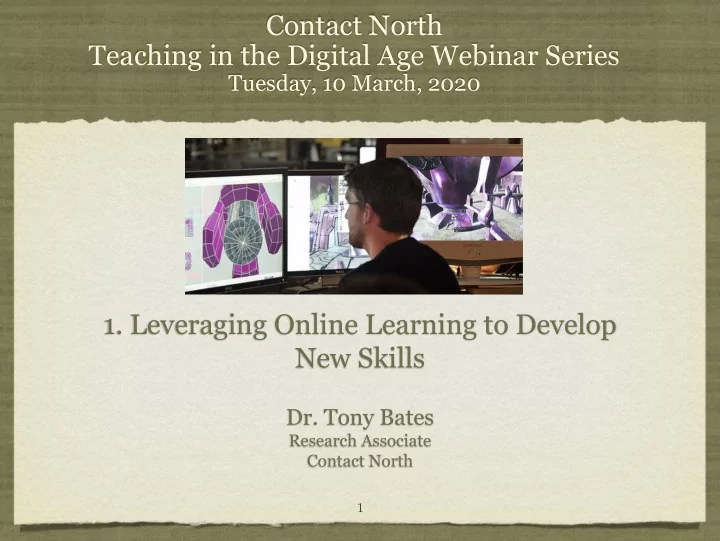

Contact North Teaching in the Digital Age Webinar Series Tuesday, 10 March, 2020 1. Leveraging Online Learning to Develop New Skills Dr. Tony Bates Research Associate Contact North 1
Overview Aim of series: • Discuss issues raised in Teaching in a Digital Age • Draw on your experiences in addressing these and related issues This webinar: • How can online learning be used to develop 21st century skills? 2
Overview: this webinar Part 1: • What skills and why ? + short discussion Part 2: • What we know about teaching skills + short discussion Part 3: examples of use of technology for skills development Part 4: open questions and discussion 3
Demands of a digital economy Changing workforce; new work and new knowledge/skills Report from RBC based on analysis of new job postings (LinkedIn) Impact of automation and AI on jobs and work There is a future for jobs; but we’re not preparing learners properly 4
What are 21st century skills? Conference Board of Canada (1993): • communication skills • independent learning • ethics/responsibility • teamwork and flexibility • thinking skills (critical thinking, problem-solving, creativity) A small start-up in automative design • IT skills embedded in subject area • knowledge management 5 5
Skills most in demand Royal Bank of Canada ‘Humans Wanted’ (2018) very important important less important not required Which of these skills do you teach – and how? Explicit or implicit? 6 6
Skills least in demand Royal Bank of Canada ‘Humans Wanted’ very important important less important not required 7 7
Putting learners first NOT just about meeting employers’ needs Transversal skills for job mobility Empowering learners to manage own lives by controlling ‘everyday’ technology How? 8
Impact of digitalization on teaching and learning AI will deliver AND assess content acquisition; teach ‘declarative’ knowledge Key instructor roles: • Curriculum/course design • Individual learner support (esp. for skills development) • Technology integration • Qualitative assessment 9
Impact of digitalization on teaching and learning Students ’ role: From • find, evaluate, apply content • develop skills • provide digital evidence of learning (e.g. e-portfolios) • become digitally literate to Institutional role: • offer recognised qualifications • academic quality assurance • data security and privacy 10
Questions: the importance of skills development 1. Is the distinction between skills and content useful? 2. Do you agree that instructors should give more emphasis to skills development and less to teaching content? 3. What do you see as the main challenges in teaching skills in higher education? 4. Other issues/questions about content vs skills?
What we know about skills development Content = facts, ideas, principles: ‘knowing’ Skills = understanding, analysing, evaluating, applying: ‘doing’ Both necessary in today’s society BUT: content has been the traditional priority 12
What we know about skills development We know a lot about how to teach skills: • Context-specific • Learners need lots of practice • Small steps initially • Regular feedback from expert Develop over a lifetime rather than one course 13
Skills development Implications for curriculum design What do we add to a lifelong skill from year 1 to Year 4? HEQCO study: not much Curriculum mapping: Dalhousie University 14
Questions Are there better/different ways to develop thinking skills? How do you match different teaching methods to different skills? (e.g. • online collaborative learning? • competency-based learning? • experiential learning? How do you increase the level of competence in a specific skill throughout a program? 15
Using online learning for skills development: four examples Contact North’s Pockets of Innovation • Simon Fraser University: scientific argumentation • Loyalist College: border services protocols • Ryerson University: law practice Bristol University: intuitive thinking in science 16
Example: scientific argumentation Teaching scientific argumentation Simon Fraser University biological sciences: Prof. Joan Sharp Students expect a ‘right’ answer for every scientific question Poor skills at scientific argumentation Simple web-based tool 17
Scientific argumentation 18
Scientific argumentation 19
Example: border services protocols Loyalist College, Ontario trains Canada Border Guards Built a ‘virtual’ border post and a virtual car Class split in two: agents and travellers; one car has drugs Teaches correct protocols/ procedures Learning improved by 38% over classroom teaching 20
Example: law practice Ryerson University, Toronto Partnership with Ontario Bar Association Lawyers as mentors: 4 months practicum + 14 weeks online ‘Virtual’ law firm with real cases to manage: 4 students + lawyer 21
Example: intuitive thinking in chemistry Bristol University, UK Graduate students need intuitive thinking to generate hypotheses Use of virtual reality dynamic module of complex chemical molecules Students can ‘physically’ change components of molecule and watch reaction 22
Questions Are you assessing 21 st century skills? How? What best practices are you/your institution using to develop/assess thinking skills? How important is digital literacy within your subject area? How can you embed this in your teaching? What role can technology play in developing and assessing thinking skills? Other questions and discussion on skills development 23
Recommend
More recommend